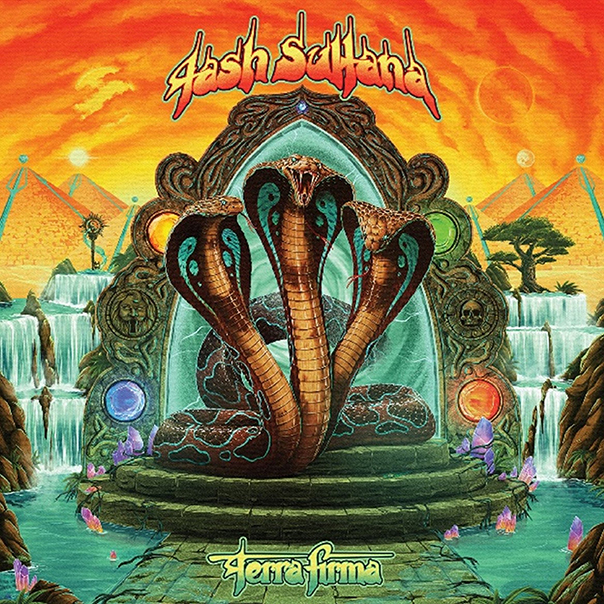ALBUM REVIEW: Tash Sultana touches down on ‘Terra Firma’

Watching Tash Sultana on YouTube–which more than 100 million people have done at this point–it’s equal parts obvious and arcane why the Australian artist has made such a global impact over the last half decade. The guitar playing is at virtuosic levels but there are no guitar hero cliches to be found. The performances are bullshit-free and almost uncomfortably intimate.
Terra Firma
Tash Sultana
Mom + Pop Music, Feb. 19
7/10
In any given clip, Sultana quite literally bounces between loop pedals, building up layer upon layer of texture before unleashing spiraling improvisational guitar solos while looking skyward and smiling ear to ear. It’s like watching someone pretend to headline a festival in their bedroom mirror free of any self-consciousness while building out extended hippy-adjacent jams that evoke expanded consciousness.
For the uninitiated, it must be said that Tash Sultana does this completely alone, one-person band style. The hooks are hard to come by and the songs are long, mellow affairs. Hardly the stuff of sold-out world tours and 3.8 million monthly Spotify listeners, and yet that’s exactly the type stratospheric success that Sultana has surfed since their 2016 debut single, “Jungle,” racked up a million views a few days after the then unknown Melbourne busker uploaded the clip to YouTube.
Terra Firma, Sultana’s sophomore album (following 2018’s Flow State), is the sound of coming back to Earth after that five-year rocket ride. Written and recorded after a self-imposed slow-down in which they made space for family, gardening and surfing, the album is a meditation on the essentials. Or as Sultana put it in a recent interview, “I needed to learn how to slow the fuck down.” The album is at its best when it does precisely that, with the tracks that speak the softest hitting the hardest. “Coma” meanders beautifully as a hypnotic dreamy folk song drenched in Daniel-Lanois-style bayou reverb before switching things up for a tempo-shifted outro featuring jazzy guitar heroics.
“Beyond The Pine” rides a slow R&B groove while Sultana’s falsetto vocal makes a case for both solitude (“Let me get some quiet for myself”) and intimacy (“I want your arms to take me, like nobody else”). It’s Sultana’s take on a slow-jam, and it totally works. “Dream My Life Away” uses a sparse arrangement, ghostly Bon-Iver-like vocals, and shimmering repeating guitar riff to great effect, lulling you to a meditative state before gently nudging you back to reality with a tasteful and restrained guitar solo.
“Dream My Life Away” is an album highlight in its own, and yet one of it’s stronger attributes is the way it clears the decks for the best song on the album.
“Maybe You’ve Changed” is a showcase for Sultana’s growing prowess as a songwriter. Stark, sorrowful and direct, it has none of the signature Sultana layered loops or guitar fireworks and is all the better for it. Built around an “Imagine” style piano arrangement, “Maybe You’ve Changed” sets up a story of a couple growing apart only to reveal that it’s someone no longer recognizing themself.
“Why don’t you believe in me no more?” Sultana repeats at the emotional zenith of the song, and it’s hard not to immediately think of all those YouTube clips of Sultana alone on stage seemingly lost in their own private universe. “Maybe You’ve Changed” is the sound of someone finding their way back to Earth via unflinching self-reflection.
The album is almost undone by some frustrating unevenness. “Crop Circles” has some striking lyrics about addressing mortality, but it’s hard to get past the plucky John Mayerisms and easy-listening vibes. “Greed” similarly quiet-storms its way through yachty smooth jazz flourishes that wear themselves out almost immediately. “Blame It on Society” sinks in the same harbor and the album drifts to the finish a few songs too long before closing with “I Am Free,” a lush and welcome return to the elements that come together so successfully earlier on the album.
Despite its inconsistency, Terra Firma remains a remarkable experience that finds a way to demonstrate real human vulnerability while building mystique around its creator. Sultana learned guitar at age 3, reportedly plays 20 different instruments and composed, arranged, performed, engineered and produced just about every note of their first two albums–all by the age of 25. There’s nothing they can’t play and less they can’t do. But it’s the restraint shown in the minimalist moments that show why slowing down was the right choice for Sultana on Terra Firma.
Follow Skott Bennett at Twitter.com/skottbennett.
